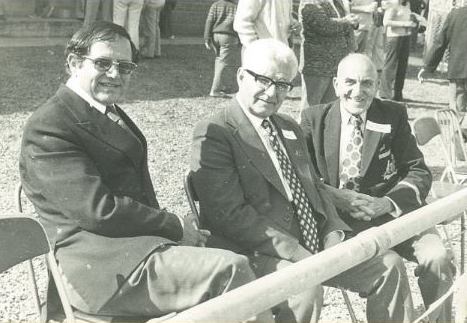Michael Weinstein AM, BEM
Michael Weinstein was born in Wloclawek, Poland in 1923. As a boy he just wanted to play football, but when only ten years old his school team was so disorganised with players not turning up that he got the job of running it. It was the same during his military service in the Second World War, where his organisational skills, rather than his playing talents were recognised.
Weinstein came to Australia in 1950 as part of the influx of European migrants. He played with Hakoah reserves, but after pointing out some deficiencies he quickly became team manager at the club. He was part of a group of newcomers who were dissatisfied with the Victorian Amateur Soccer Football Association (VASFA). He was heavily involved in the replacement of VASFA by the Victorian Soccer Federation (VSF) in 1962, both as a leader of the clubs seeking change and helping to negotiate the settlement which was reached. He worked closely with Theo Marmaras to bring this about in a way which ensured continuity between the old and the new body. He was appointed as one of the Treasurers of the VSF in 1963. He helped purchase Soccer House in St Kilda, the VSF’s first home.

Weinstein became Chair of the State League Management Committee in 1965 and held that post again in 1966 and he became a Trustee of the Federation. In 1966, he chaired the VSF Reorganisation Committee which produced a major report recommending significant changes in the organisation of the game in Victoria, many of which were subsequently carried out. In 1967 Theo Marmaras succeeded Harry Dockerty as President of the VSF and Weinstein took over as Chairman of the Board of Management a role he held until 1986, apart from a brief interlude in 1970-72. He presided over a period of fundamental changes in the game as the focus switched from the states to national and international activity.
Weinstein played a significant role in the setting up of the Australian Soccer Federation (ASF) in 1961 and was a founder member of the Federation. He was one of the key figures in the negotiations leading to the lifting of Australia’s suspension by FIFA in 1963. He became Vice-President of the ASF from 1975 to 1986.

He led several overseas tours as manager of teams, was a member of the Committee which organised the FIFA World Youth Cup in 1981, and a delegate to the Australian Olympic Committee. His dedication to youth football is evidenced by the medal for the best Under-16 player in Victoria each year, which was named in his honour.
Weinstein was a life member of Football Victoria and Football Australia, and was an inaugural inducted into the FFA Hall of Fame in 1999. He was awarded the British Empire Medal in 1977 for his services to sport and the Australia Medal in 1986 for his services to soccer.
Michael Weinsten passed away on New Year's Eve in 2011, aged 89.
